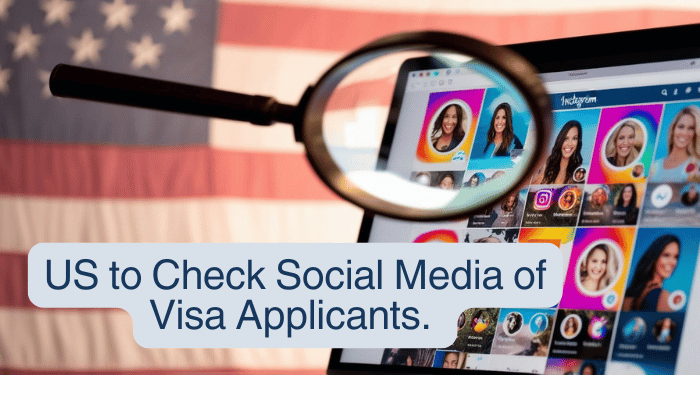US to Check Social Media for Visa Applicants

The U.S. Citizenship and Immigration Services (USCIS) recently outlined a proposal that would allow them to access and review the social media accounts of individuals applying for citizenship, residency, or asylum in the United States. This move, justified by the need to comply with President Trump's executive order on immigration, has raised significant concerns.
Key Facts:
- Proposal: USCIS seeks to collect social media identifiers from immigration applicants.
- Purpose: Identity verification, national security, and public safety screening.
- Justification: Compliance with Trump's "Protecting the United States" executive order.
- Affected: An estimated 3.57 million applicants annually.
- Public Comment: The proposal is open for public comments for 60 days.
The Sheer Scale of Impact
- It's important to grasp the sheer number of individuals who could be subjected to this increased scrutiny. According to USCIS estimates, this policy could affect approximately 3.57 million applicants annually. This vast number underscores the potential for widespread implications, affecting people seeking:
- Citizenship
- Residency (Green Cards)
- Asylum
- This means that millions of individuals will have their online presence potentially examined, creating a significant increase in data collection and analysis for USCIS.
- The fact that such a large number of people will be effected, is why there is such a large amount of worry about the policy.
The Proposal and Its Implications
Under this proposal, USCIS would collect social media identifiers (handles) from applicants to aid in "identity verification, national security and public safety screening, and vetting." While the agency emphasizes that passwords will not be requested, the mere collection of this data raises serious privacy concerns.
- Increased Scrutiny: Applicants may face heightened scrutiny of their online activity, with authorities potentially reviewing posts, comments, and interactions that could be misinterpreted as a security risk.
- Chilling Effect: This policy could discourage individuals from freely expressing their opinions online, fearing that their words might negatively impact their immigration applications.
- Processing Delays: The increased scrutiny and data analysis could lead to significant delays in the immigration process, causing undue hardship for applicants.
Protecting Yourself:
If you are considering applying for immigration benefits in the U.S., it is crucial to be mindful of your online presence. Here are some steps you can take:
- Review and Update Your Profiles: Ensure your social media profiles reflect accurate information and avoid engaging in any content that could be misconstrued as a security risk.
- Maintain Privacy Settings: Utilize privacy settings to limit the visibility of your posts and restrict access to your personal information.
- Consult with an Immigration Attorney: Seek professional guidance to understand the potential implications of this policy on your specific situation.





